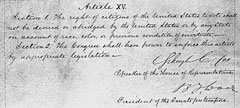




Congress and Civil Rights
Reconstructing the South became a divisive issue in national politics, pitting President Johnson against the Republican majority in Congress. Eventually, Congress implemented its own plan of Reconstruction, based on federal action protecting the rights of the former slaves.
Federal laws and two further Constitutional Amendments established the principle of equal rights for all citizens, regardless of race.

When Congress assembled in December 1865, Radical Republicans called for the overthrow of the governments established under President Johnson's Reconstruction policy and the establishment of new ones with black men as well as white allowed to vote. Moderate Republicans, still hoping to work with the president, rejected this plan.
Following their lead, Congress adopted two bills, one extending the life of the Freedmen's Bureau, the second, the Civil Rights Act of 1866, guaranteeing blacks' equality before the law, short of the suffrage.
![]() Find
out more about the Freedman's Bureau
Find
out more about the Freedman's Bureau
Johnson's veto of these measures moved many moderates into the radical camp, and inaugurated a bitter conflict over control of Reconstruction policy, which culminated in 1868 when he was nearly removed from office by impeachment.
In 1866, Congress passed the Civil Rights Act over Johnson's veto, and proceeded to approve the Fourteenth Amendment, which forbade states to deprive any citizen of the "equal protection of the laws," the first Constitutional guarantee of the principle of equal civil rights regardless of race.
![]() Read
the 14th Amendment
Read
the 14th Amendment
![]() Read the Civil Rights
Bill of 1866
Read the Civil Rights
Bill of 1866
![]() Read
the 15th Amendment
Read
the 15th Amendment
This was a major change in the federal system, establishing the national government as the arbiter of citizens' rights, and empowering it to overturn discriminatory measures adopted by state governments.
The Civil Rights Bill was the first major law in American history to be passed over a presidential veto.

In 1870, the last of the Reconstruction-era Constitutional Amendments was ratified -- the Fifteenth Amendment, which prohibited states from abridging the right to vote because of race.